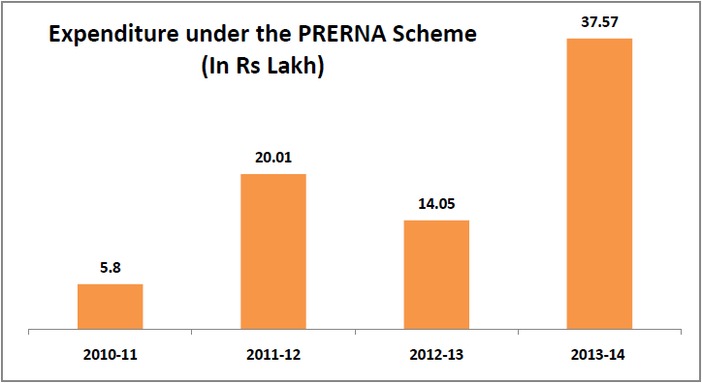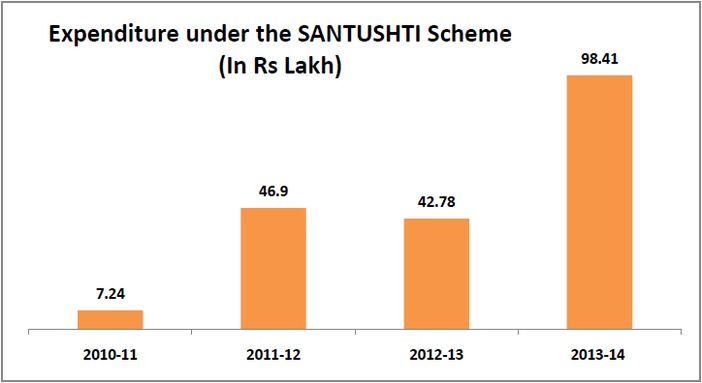[orc]Have you heard of the Jansankhya Sthirata Kosh(JSK)? This is a fund setup by the government of India to promote schemes & practices to stabilize population in some of the most populous states. Prerna & Santhusti are the flagship schemes under this fund. Data indicates that there is little awareness of the existence of these schemes.
It would not be an exaggeration to say, that any discussion on India‘s problems would be incomplete without the mention of the population. Hence ‘Population Stabilization’ or ‘Family Planning’ has been on the government’s priority list for a few decades now. The Jansankhya Sthirata Kosh (JSK) or the National Population Stabilization Fund (NPSF) is an effort in that direction. The data on funds utilized in JSK indicates that there is very little awareness about its schemes.
Background
The Government of India had set up a National Population Stabilization Fund (NPSF) in the year 2004-05 with a one-time grant of Rs.100 crore in the form of a corpus fund. This is now known as Jansankhya Sthirata Kosh (JSK). To empower the NPSF, Government of India has set up Jansankhya Sthirata Kosh (JSK). This is an autonomous body and can take all the policy related decisions. It can raise contributions from organisations and individuals that support population stabilisation. JSK implements two schemes, namely, Santushti and Prerna.
PRERNA
In order to help push up the age of marriage of girls and space the birth of children in the interest of health of young mothers and infants, JSK launched PRERNA, a responsible Parenthood Strategy in seven focus states namely Bihar, Uttar Pradesh, Madhya Pradesh, Chhattisgarh, Jharkhand, Odisha, and Rajasthan.
The strategy recognizes and awards couples who have broken the stereotype of early marriage, early childbirth and repeated child birth and have helped change the mindsets of the community.
The important conditions for any couple to be eligible under this scheme are
- Couple must belong to BPL family
- Age of lady should not exceed 30 years
- The girl should have been married after 19 years
- First child birth after at least 2 years of marriage
- Second child birth after at least 3 years of the first child birth
- Either parent voluntarily accepts permanent method of family planning within one year of the second child birth
The couple will get an award of Rs.10,000 if it is a Boy child or Rs.12,000 if it is a Girl child. If birth of the second child takes place after at least 3 years of the birth of first child and either parent voluntarily accept permanent method of family planning within one year of the birth of the second child, the couple will get an additional award of Rs.5,000/- (Boy child) / Rs.7,000/- (Girl child). The amount of award is given in the form of National Saving Certificate (NSC). The scheme is meant only for BPL families.
If the girl gets married after 19 years and if the first child is born after at least 2 years of marriage
- 10,000/- if boy child
- 12,000/- if girl child
In addition to the above, if the birth of the second child takes place after at least 3 years of the birth of first child and either parent voluntarily accept permanent method of family planning within one year of the birth of the second child, then the couple gets a total of
- 15,000/- if both boy child
- 17,000/- if one boy & one girl child
- 19,000/- if both girl child
The funds released & number of couples awarded in the last 4 years under this scheme clearly shows that the scheme is not well publicized. From 2010-11 to 2012-13, more than 1500 couples have been awarded under the scheme with a total expenditure of 77.4 lakh rupees. In 2013-14, the expenditure went up to 37.57 lakh rupees. But the number of couples awarded is not available.
| Year | No. of Couple awarded /Selected | Expenditure (in Rs Lakh) |
|---|---|---|
| 2010-11 | 628 | 5.8 |
| 2011-12 | 391 | 20.01 |
| 2012-13 | 494 | 14.05 |
| 2013-14 | NA | 37.57 |
SANTUSHTI
Santushti is a scheme of Jansankhya Sthirata Kosh (JSK) for the highly populated states of India viz Bihar, Uttar Pradesh, Madhya Pradesh, Rajasthan, Jharkhand, Chhattisgarh & Odisha. Under this strategy, Jansankhya Sthirata Kosh, invites private sector gynecologists and vasectomy surgeons to conduct sterilization operations in Public Private Partnership mode. According to this Scheme, an accredited private Nursing Home/ Hospital can sign a tripartite MOU between the State Health Society, accredited private health facility and JSK. Upon signing the MOU the private hospitals/nursing homes shall be entitled to incentive by JSK whenever it conducts 10 or more Tubectomy/Vasectomy cases in a month. The accreditation is done by the district and approved by the State Health Society.
The following are the features of this scheme
- Accredited Private Hospitals/Nursing Homes, who conduct 10 Tubectomy (Female Sterilisation) and Vasectomy (Male Sterilisation) operations in a month, will be eligible for payment under Santushti Strategy.
- Private facilities conforming to the aforesaid criteria are entitled for an additional top-up amount of Rs. 500/- per case which will be paid by JSK for organizational activities.
- There is also a provision for payment of wage compensation to the clients undergoing sterilisation operations @ Rs.600/-for Tubectomy and Rs 1100/- for Vasectomy clients.
The funds released and the number of sterilizations conducted is again a testimony of the lack of awareness of the scheme. More than 12 thousand sterilizations took place from 2010-11 to 2012-13. The only silver lining is that the expenditure is rising every year indicating an increase in the awareness.
| Year | No. of Sterilization | Expenditure(Rs in lakh) |
|---|---|---|
| 2010-11 | 1368 | 7.24 |
| 2011-12 | 2307 | 46.9 |
| 2012-13 | 8752 | 42.78 |
| 2013-14 | NA | 98.41 |




